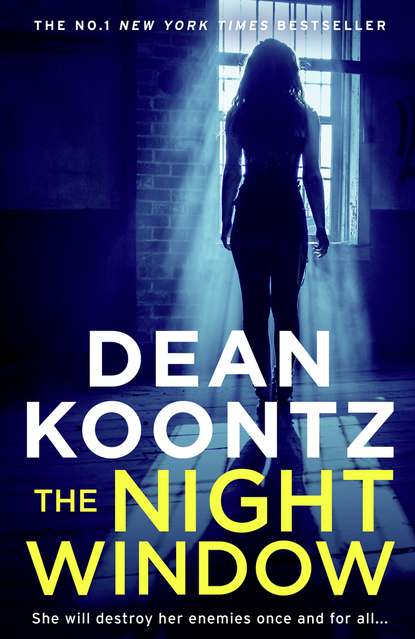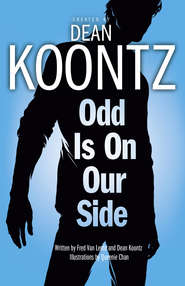По всем вопросам обращайтесь на: info@litportal.ru
(©) 2003-2025.
✖
Jane Hawk Thriller
Автор
Год написания книги
2019
Настройки чтения
Размер шрифта
Высота строк
Поля
He turned his back on her and went to a square of perfboard beside a workbench and took a set of keys from one of the pegs.
“We knew who we were looking for—names, faces—but a lot of the time they changed their appearance. This funny thing happens when you use facial-recognition programs to see through disguises. When you do it long enough, often enough, it’s as if your brain uploads a little of the software, so you develop an eye for a masquerade, no matter how well it’s done.”
When he returned to her, he held out the keys, which she didn’t at once accept.
“Another problem you have is you’re a damn good-looking woman.”
“If I were Hawk, what should I do—scar myself?”
“Women as good-looking as you rarely use so much makeup and eye shadow, such bright lipstick. If it can’t improve the face, maybe it’s meant to obscure it.”
“That’s all you’ve got?”
“The mole on the upper lip. Why haven’t you had it removed?”
“I’m skittish about doctors and scalpels.”
“Fake moles, fake port-wine birthmarks, fake tattoos—they’re popular camouflage. I don’t need a scalpel. Bet I could remove it with a little spirit-gum solvent.”
“Leslie Anderson,” she insisted. “Born in Portland, late of Vegas, got myself in trouble when I jacked five thousand credit-card numbers that my hacker boss had stolen, went into business for myself, running a buy-and-fence operation, until he found me.”
Nolan still held out the keys. “The color-changing contact lens on your left eye isn’t fitted properly. There’s a thin crescent of blue above the gray. Jane Hawk has blue eyes.”
She remembered how, on first meeting him, he had not looked her up and down, but had stared intently into her eyes.
“The ash-blond wig is the best, tightly fitted for action,” he said. “But if the color was natural, your skin would probably be paler. With your complexion, your hair’s more likely to be honey blond—like Jane Hawk’s.”
She took the keys from him. “I don’t have to be Jane Hawk to need the bike. But if you’re hot on giving it to Leslie Anderson—”
“‘—born in Portland, late of Vegas,’” he said. “Another thing is how you move. Spine straight, shoulders back, athletic, quick and confident. That’s how she moves in what film they have of her.”
“Mama Anderson taught her girl not to slouch.”
“Then there’s the fact the media says Jane Hawk took part in some terrorist attack in Borrego Springs three days ago, maybe a hundred dead, maybe a lot more than that. They say she’s still somewhere in Southern California.”
“If I were her,” Jane said, “I’d be long gone from the state.”
Denied the chance to investigate the tote’s contents, the mastiff grumbled with disappointment when Jane picked up the bag.
“I really can pay for this,” she said.
“Then what would I have to brag on when you’re vindicated?”
She stowed the tote in one of the bike’s saddlebags. “Let’s say I’m her. Why would you do this?”
“From my days in … the service, I know how deeply the enemies of freedom have penetrated this country’s institutions, public and private sector. The way they’re demonizing you, their viciousness and ferocity, tells me you’re right about the plague of suicides, and somehow it’s … engineered.”
“I haven’t heard Hawk says it’s engineered.”
“Maybe because nobody’s given her a chance. Digital technology and biotech—somehow they have to be part of this.”
“I wouldn’t know.”
He said, “People are dazzled by high tech, but there’s a dark side, dark and darker. What horror isn’t possible today … it’ll be possible tomorrow.”
“Or maybe it is, after all, possible today,” she said.
12 (#ulink_94660a53-2c0e-57ea-945f-794b17becf16)
The three rayshaws were of a physical type, big men with thick necks and broad shoulders and sledgehammer fists, their eyes cold, their stares as impersonal as camera lenses, as if they were not of women born, but instead were immortal archetypes of violence, risen from some infernal realm millennia earlier, having come down the centuries on a mission of barbarity, cruelty, and murder.
They escorted Tom Buckle to the guest suite where he’d left his baggage. Nothing he said could engender a response. They spoke to him only to tell him what he must do. They didn’t overtly threaten him; mortal threat was implicit in their every look and action.
Items that didn’t belong to him had been placed on the bed: long underwear, a flannel shirt, a Gore-Tex/Thermolite storm suit by Hard Corps, two different kinds of socks, supple-looking gloves. Beside the bed stood a pair of boots.
“Strip naked,” one of the men commanded. “Dress in those things.”
Tom recognized the futility of appealing to these creatures’ common humanity, for there was nothing human about them other than their form. Their faces varied, but their expressions were eerily the same, as neutral as the masks of mannequins. No emotion shaped their features. Their faces lacked evidence of personality, and they seemed as remote and ghastly as the pale whiteness of the moon in daylight.
Wainwright Hollister’s movie was in fact reality, and Tom Buckle was the doomed lead in a noir thriller where the theme was meant to be the hopelessness of hoping. He was Edmond O’Brien in D.O.A. Robert Mitchum in Out of the Past.
Watching him undress, the three men said nothing.
He obeyed them. He could do nothing but obey. He believed Hollister’s assertion that they were killing machines.
For twenty-six years, he had lived a relatively charmed life, on a glide path into film directing. He’d never known terror until now. He was terrified not only of these creatures and of Hollister, but also by a sudden sense that a sinkhole might open in his psyche, a sucking black madness from which there could be no escape.
As Tom dressed in the storm suit, Mai-Mai’s suicide played in his memory so vividly that the room around him seemed to darkle like a theater where all the light was contained within the screen: her exquisite face, her beautiful body, she a symbol of mystical power, as if she were a goddess who stepped down from a heretofore unknown pantheon, the scene remembered in black-white-gray, as though from a movie made in the 1930s, but for the scarlet silk scarf that slid off her hand and the muzzle flash of the pistol, her collapsing with an awful grace, her seeming power revealed as an illusion, removed from this world with as little concern as Hollister might give to a cockroach before stamping on it.
The room was warm, but Tom felt as cold as the snow-swept world beyond the windows. His heart drummed with fear, but there was anger in it, too, an icy rage that scared him. He had never been an angry man. He worried that his fury might compel him to do something that would diminish his already slim chance of survival.
When he was suited and booted, with the hood snug around his face, the three men led him into the vast garage, where Hollister maintained a collection of expensive, exotic vehicles: a Lamborghini Huracán, a Rolls-Royce Phantom, a Bugatti Chiron, an armored Gurkha by Terradyne, and maybe twenty others. A showroom-tile floor. A pin spot highlighting each set of wheels.
They took him to a Hennessey VelociRaptor 6 × 6, which was a bespoke version of a Ford F-150 Raptor, a jacked-up six-wheel crew-cab truck with numerous upgrades. The driver sat alone in the front. The other two rayshaws flanked their prisoner in the backseat, so that Tom felt wedged between the jaws of a vise.
As they drove into the gray light and spiraling snow showers of the late afternoon, the hulk to Tom’s right recited the simple rules of the hunt. The quarry would be given a two-hour lead. On foot, he could head in any direction that he wished—except that he must not attempt to return to the residence. Security sensors would be aware of his approach well before he drew near the house, and he would be cut down by Crystal Creek Ranch personnel with Uzis.
“Adjusted people,” Tom said, still struggling to believe what ample evidence proved to be true.
His instructor’s facial features remained as graven as cemetery granite, his stare chisel sharp but shallow. “The quarry will be armed with a nine-millimeter Glock featuring a ten-round magazine.” Neither he nor the other men used Tom’s name or even once referred to him with the pronoun you.
The rayshaw produced the gun, sans ammunition, and briefly explained its features.
Tom owned a pistol with which he practiced, at most, once a year. The other three hundred and sixty-four days, the weapon was in the back of his nightstand drawer. He had no illusions about being a good marksman.
His instructor gave him the Glock. “The magazine and ammunition will be provided upon arrival at the starting position of the hunt. The quarry will also receive six PowerBars for energy, as well as a tactical flashlight.”
“A map,” Tom said. “A map and a compass.”











